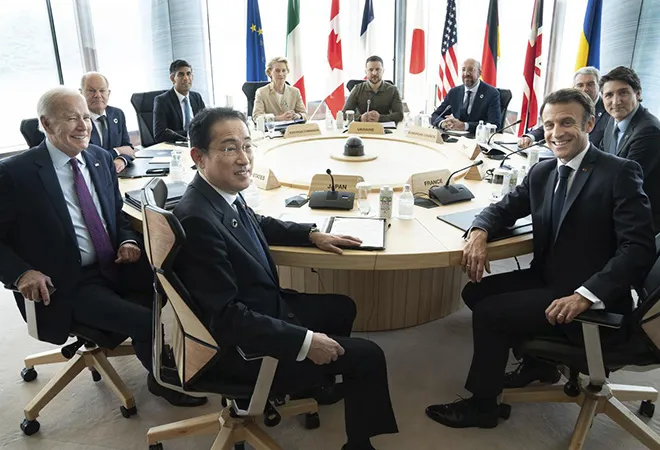The G-7 Hiroshima Summit is the first hosted by Tokyo since the 2008 summit and comes at a time when the world is faced with enervating challenges such as the war in Ukraine, the threat of nuclear proliferation, rapidly transpiring impacts of climate change, economic security, unstable supply chains and the impact and regulation of sensitive technologies. While the agenda for the Summit was expansive and ambitious, the imperative for the G-7 countries, led by Japan, appeared to be centered around the means to consolidate approaches toward the most pressing global issues while walking respective geopolitical tightropes.
For Tokyo, the Summit was driven, in large part, by the need to define and devise the means of navigating the complex geopolitical landscape of the Indo-Pacific in order to enable collaborations that would be functional as well as act as bulwarks. It was a moment to reinforce partnerships in a region that has become laden with security risks and is a key theatre for great power competition while simultaneously being the principal geography on which the trajectory of the rest of the world’s fortunes depends.
Why the agenda is vital for Japan
Issues that weighed heavily on the agenda of the Hiroshima Summit included Russia’s aggression in Ukraine which is now more than a year old and shows little signs of abating; a China that is increasingly on the offensive with an ever-active military and nuclear modernisation plan; China’s growing military pressures on Taiwan; and the dangers posed by North Korea’s increasingly volatile nuclear posturing and nuclear weapons programme. While all of these issues are of great significance globally, for the Indo-Pacific and for Japan in particular, these are vital given the country’s geographical location in close proximity to China, Russia, and North Korea. Concurrently, both in the weeks leading up to the Summit and during it, Tokyo sought to step up collaboration in science and technology and progressed its objective of reinvigorating the country’s chip industry.
Japan has announced a number of changes to its defence policy, including plans to increase its defence spending and acquire new weapons systems.
Security, nevertheless, informed much of the agenda at the Summit. The war in Ukraine has had a significant impact on Japan’s national security strategy. In the wake of the invasion, Japan has announced a number of changes to its defence policy, including plans to increase its defence spending and acquire new weapons systems. Similarly, China has been rapidly expanding its military power in recent years, and has been increasingly assertive in its territorial claims in the East China Sea and the South China Sea. Tokyo is no stranger to the debilitating consequences of a nuclear attack and is quite naturally concerned about the frequent nuclear posturing by Pyongyang with the latter not only conducting a number of missile tests in recent years but also threatening to attack Japan with nuclear weapons. These concerns are also shared by Seoul and Washington and are a key driving force behind U.S. efforts at strengthening the security architecture of Northeast Asia.
New Delhi-Tokyo partnership is important
Recent years have witnessed steady collaboration between New Delhi and Tokyo, with regular joint military exercises and the progress of agreements on economic cooperation. While Japan has been involved in the South Asian region through its involvement in several infrastructure initiatives, recent years have witnessed India partnering with Japan for advancing the same objective through the development of infrastructure projects in third countries in the Indo-Pacific region. As two of the world’s largest democracies, the continued cooperation between India and Japan is an important indicator of what sustained partnerships can achieve in addressing the challenges of the 21st century. The G-7 2023 Summit was another opportunity for Japan and India to further strengthen their partnership and expand the scope of their shared interests.
Two key principles form the central basis for both Japan and India’s role in the Indo-Pacific — first, the preservation of a rules-based order; and second, opposition to any unilateral attempt to alter regional order. Both countries reiterated these principles at the Hiroshima Summit, particularly with reference to Russia and China. Closer and stronger ties between India and Japan are significant for boosting middle-power diplomacy in the region.
Advancing Shinzo Abe’s legacy
Fumio Kishida, as the current Japanese Prime Minister, is enthusiastically carrying forward the legacy of his predecessor, Shinzo Abe, who was a strong advocate for Japan’s active role in the world, and worked determinedly to strengthen the country’s ties with its allies. Mr. Kishida’s efforts are evident in the strong network building that he has undertaken, and the Hiroshima Summit, which saw the participation of India, South Korea, Vietnam, Indonesia, Australia, and Brazil among others, is a further instance of Japan looking to build upon its relationships and transform them into partnerships that would bolster the region. His efforts saw agreements with the United Kingdom, Australia, the U.S., Africa, and the Quad (Australia, India, Japan and the U.S.). If Shinzo Abe laid the foundations of a more involved Japanese global presence, Mr. Kishida has advanced Shinzo Abe’s work by developing security and diplomatic partnerships across the world including with neighbouring South Korea with which bilateral ties have been historically tenuous. The Hiroshima Summit reinforced Japan’s re-emergence as a critical security actor which is increasingly willing to shape the emerging strategic contours of the Indo-Pacific and the wider global order.
This commentary origianlly appeared in The Hindu.


